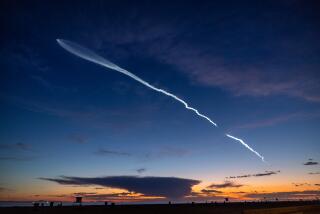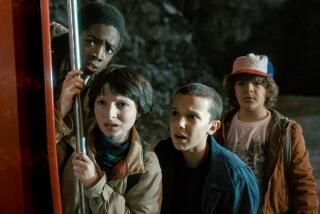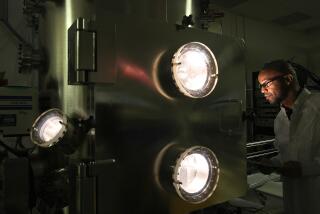California lawmakers weigh tax credit for bomber program
A bitter fight has broken out between aerospace industry behemoths over fast-tracked legislation that could provide one company with an upper hand in an upcoming $55-billion competition to build a fleet of next-generation stealth bombers.
On one side is Northrop Grumman Corp., which built 21 bat-winged B-2 bombers in Palmdale two decades ago. On the other is a team of Boeing Co. and Lockheed Martin Corp., the nation’s two biggest military contractors.
At issue is whether favoritism is at work in a bill in the California Legislature that calls for a $420-million tax credit over 15 years for a subcontracting company that builds at least 35% of “a new advanced strategic aircraft for the United States Air Force.”
Although the program isn’t specifically named, it is clear to aerospace industry insiders that it’s a reference to the military’s hotly contested competition to build as many as 100 new nuclear-capable bombers.
Boeing and Lockheed have been lobbying for the tax break at the governor’s office for 10 weeks, lawmakers said, but only recently has Northrop sprung into action.
Northrop says the bill, AB 2389, as written stacks the deck in favor of its competitors.
As it stands, only two bidders are expected for the bomber contract. And by limiting the tax credit to a “subcontractor,” the Assembly bill is favoring Lockheed, which is a subcontractor to Chicago-based Boeing’s bid.
Northrop is a prime contractor, so it wouldn’t be covered by the proposed measure. The company complains that it may not be able to come up with a low-enough bid to win the Air Force contract without getting the same tax break.
“Legislation that favors only one company is detrimental to California’s future aerospace industry,” Northrop spokesman Tim Paynter wrote in an emailed statement.
At a state Senate hearing Tuesday, Northrop asked that the bill be amended slightly so it would also cover “any contractor.” The request was ignored, and the bill was passed on a 4-2 vote of the Senate Governance and Finance Committee.
Northrop officials are now talking to the governor’s office and lawmakers, hoping to head off votes tentatively set for Thursday in the Senate Appropriations Committee and afterward in the full Senate.
The bill was written by Assemblyman Steve Fox, a Democrat, and Sen. Stephen Knight, a Republican, both of Palmdale. It is there, deep in the Mojave Desert, that both Lockheed and Northrop work in secret facilities designing and building the latest military aircraft at Air Force Plant 42.
Lockheed has about 3,000 people working there out of its 13,000 employees in California. Northrop, the largest aerospace industry employer in the state at about 24,000, has more than 3,000 people in Palmdale.
So why was Northrop left out of the bill? The answer, Knight said, is simple: Northrop Grumman’s “engagement was very, very low” while “for the last 10 weeks, Lockheed was up here dealing with the governor,” putting together the tax credit legislation. As a result, “Lockheed had a big presence when the language came out,” Knight said.
The governor’s office declined to comment for the record. But people close to the negotiations, who were not authorized to speak to reporters, confirmed that Northrop came very late to the table after the governor’s office had finished work on its proposed legislation.
Northrop said it learned only recently that an advanced strategic aircraft tax break was in play in the California Legislature.
Nevertheless, Knight said he told Northrop that it still has a chance to get its own tax-break bill passed when the Legislature returns from monthlong summer recess Aug. 4. But it’s unclear whether that would be too late for Northrop’s bid to the Air Force. The timeline is classified.
The bill, which the Assembly approved 72 to 2 last week, has plenty of strong support.
Besides Boeing and Lockheed, key backers include the administration of Gov. Jerry Brown, the California Chamber of Commerce, the California Manufacturers & Technology Assn., the California Conference of Machinists and the city of Palmdale.
Getting a new bomber contract could be a boon to California, generating as much as $80 billion in federal spending in the Golden State, said Fox, the bill’s coauthor. That level of economic activity would more than pay for the tax credit, a representative of the governor’s Department of Finance testified at the Senate hearing Tuesday.
The lucrative program — which comes at a time when military spending is set to decline — is expected to provide jobs and decades of work for Southern California’s aerospace industry no matter who wins. Mom-and-pop machine shops and other contractors across the Southland probably would be called upon to make parts for the bomber.
“The proposed legislation is part of the administration’s efforts to encourage business to expand in California and demonstrates that the state is actively pursuing opportunities to spur job creation in manufacturing and aerospace,” said Mike Rossi, the governor’s senior advisor for jobs and business development.
Boeing declined to talk about the bill, but Lockheed played up the jobs angle.
Lockheed spokesman Gordon Johndroe said in a statement: “State leaders recognize that aerospace is a critical industry to retain and grow well-paying jobs for Californians, especially highly skilled engineering and technical jobs.”
Twitter: @marclifsher
Twitter: @wjhenn
Lifsher reported from Sacramento and Hennigan from Los Angeles.








